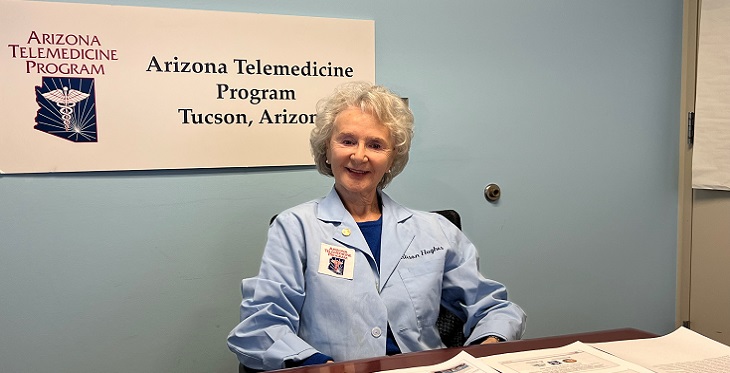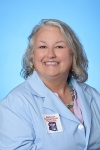Looking back at Alison Hughes’ career, it’s hard not to be in awe over the roads she’s traveled with civil rights and social justice leading almost every turn that eventually led her to Tucson in 1970.
“It’s a life,” Hughes said, shrugging off the compliment with a smile in her light Scottish accent.
That life, however, took Hughes from her native Scotland to study in the United States at age 19. In the early ’60s, she worked at the United States Commission on Civil Rights, and participated in the 1963 Civil Rights March in D.C. led by Rev. Martin Luther King Jr.
In Tucson, Hughes became involved in politics and public service, but in the mid-’80s she was offered a job that would put her in a position to help further the work of the University of Arizona’s Rural Health Office’s Andy Nichols, and eventually help create the Arizona Telemedicine Program with Dr. Ron Weinstein.
“It brings tears to my eyes. I think it was the best decision I ever made, and I never regretted it a day of my life,” Hughes said about her decision to accept the associate director position at the Rural Health Office. “I loved my job so sincerely because there was so much that was possible. Really, it’s about trying to make the impossible possible.”
Hughes was recruited by the late Nichols, a legend who directed the Rural Health Office with an unparalleled fervor that pushed healthcare access into disparate rural and Indigenous communities throughout the state.
“I remember when I met with Andy and he asked, ‘How would you want to approach this job,’” Hughes recalled. “I said, ‘Well Andy, the first thing I'd like to do is take a drive around rural Arizona and look for myself. I'd like to see it.’ and that's what I did. I got a rental car and researched where clinics and hospitals were and made appointments, and when I visited them, I asked what the issues were that they faced?”
When she returned to the office, Hughes started applying for federal grants with a trademark zeal. The first grant she received was for training practitioners in rural communities. More and more grants came in, and in return the Rural Health Center’s reach, programming and financial health grew, drawing plenty of envy and a bit of ire from colleagues in other areas of medicine and health care.
“To me it was always about justice. It was about equal rights for rural people,” Hughes said.
Hughes’ work in rural health eventually led her to a newly emerging area of healthcare, one she quickly understood had great potential to be an equalizer in increasing access in rural communities – telemedicine. Hughes said she received a call from John Lee, a legislative staff member who worked for the state’s Joint Legislative Budget Committee assigned to the University of Arizona budget and chaired by former Senator Bob Burns.
In that budget was $1.2 million and an expectation it was headed for rural health, but politics got in the way. Hughes said there was a legislator who wasn’t a fan of her boss. However, Burns wanted to work fast to keep the funds aligned with healthcare.
“He said ‘We've got $1.2 million available that we could use to support a telemedicine program,’” Hughes recalled. “That felt bad to me, but what can you do? They have the power.”
Introductions from Burns were made to Dr. Weinstein in the mid-1990s and the beginning of the Arizona Telemedicine Program. Like the beginning of her work with Rural Health, Hughes and colleagues from Telemedicine crisscrossed the state to make those first connections.
“Looking back at it all, it worked beautifully,” Hughes said, particularly with master technicians on hand like Michael Holcomb, Pete Yonsetto and Janet Major– still part of the technology team at the Arizona Telemedicine Program today.
Hughes, Weinstein and other team members took drives across the state into rural communities to look at where the Arizona Telemedicine Program could partner–paying close attention to community hospitals and clinics. Relationships that developed in those early days are memories Hughes said she still holds dear.
“I remember one doctor near Globe who shared a story with me about a farmer who came by and brought his detached thumb–a farming accident–to see if the doctor could reattach it. He just held out his thumb to the doc matter of factly,” Hughes recalled. “To me that’s amazing. Rural people and communities are so resilient. You must have so much respect for living up in the middle of nowhere, right? And in those days, you know, some barely had a telephone.”
Hughes said learning new technology back then was a small part of a learning curve ahead of her, but what she recognized is that in advancing telemedicine you have to ask yourself “Are you still making it work for other people that need it?”
“That's a wonderful thing to be able to do,” she said.
Now retired, Hughes said she’s lucky she’s able to keep up with the work taking place in rural Arizona evaluating federal grant applications.
“I call that my brainwork. I am learning what's going on in healthcare throughout the country. And I know about the disparities that exist that impact by Native Americans, African Americans, Hispanic Americans, and Asian Americans. They're huge. Huge. Urban and rural,” Hughes said. “I see that the importance of the work of Rural Health and the Arizona Telemedicine Program needs to continue.”
As those areas continue, new challenges arise. Hughes said digital navigation is at the top of her list.
“There are a lot of people in the population that need to be trained in how to use the technology. And they may not be able to afford to have an iPhone or smartphone. And so they're very limited. They have to go to the public library, get access to emails. Never mind texting, everybody's texting nowadays, but there is a large population that does not have access to that,” she said.
Looking back with Hughes, it’s hard not to wonder if she misses being in the social justice trenches, she carved out in her work with Rural Health and the Arizona Telemedicine Program.
“I am so settled and happy in my life, I don't need to miss anything. And I appreciate the fact that I have had these opportunities. I was lucky,” Hughes said. “Think I'm just lucky in life. Of course, I worked hard. I was a workaholic. No question about that. I’d do it all again.”

